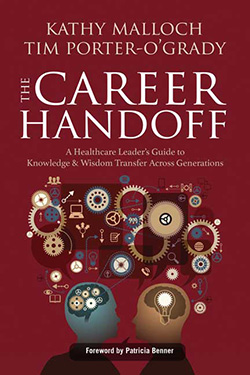“I realized working 3-11 p.m. was going to be difficult with [having my] children in school and changes were occurring within the hospitals,” Lasoff says.
Because she enjoyed working with the geriatric population, Lasoff earned a certification in gerontological nursing practice offered by the American Nurses Credentialing Center, and then she accepted a position as an assistant director of nursing at a nursing home. In this position, she was able to provide training to the staff and be home for her family when they needed her.
But this wouldn’t be her last career move. In fact, she’d be making one more.

Peggy Lasoff, RN, BSN
After earning certification for hospice/palliative care from the American Nurses Association, Lasoff began working in the field. Today, she is a hospice/palliative care clinical manager with the Visiting Nurse Association Health Group of New Jersey.
When It’s Time to Change
Now Mary C. Krug, MSN, APN, RN, works for UnitedHealthcare doing annual home visits for their Medicare Advantage members. She’s also on the Board of Directors for the New Jersey State Nurses Association. Throughout her career, she’s worked in a number of different nursing positions. But she always knew when it was time to change to the next one.“I do not regret any of my job changes,” says Krug. “Each one gave me knowledge and experience, which serves me every day in caring for people. I would not do one thing differently. I only wish I had more working years in my future to try out a few more different positions!”
After she graduated and became an RN, Krug worked for a year in general medical/surgical nursing in a hospital. When she decided that she wanted to move to critical care, she took a six-week course at the hospital on reading cardiac monitors and intracranial monitors as well as managing ventilators and other information she needed to work in critical care.
Krug stayed in critical care for 10 years, then earned her Master’s degree in nursing in adult primary care and became an Advanced Practice Nurse (APN). While studying for her APN, Krug worked in an emergency room because while she knew how to treat critical patients, she wanted to handle other injuries or illnesses like sprains or upper respiratory infections.
When she finished her training, Krug worked for a primary care doctor. She would later work in college health, women’s health, and for a dermatologist before moving to her present position.

Mary C. Krug, MSN, APN, RN
In the beginning of her career, Mary Ellen Levine, MSN/Ed, RN, was a staff nurse with a medical and surgical unit that specialized in respiratory and neurological care. When she was asked to educate a family about hospice care for their loved one who had experienced a severe brain injury with no chance of recovery, it triggered something in her.
“It touched a chord in me. I would want to have all the information and know all the options if this were my family,” says Levine. She knew that it was time to make a change, and for her, that change was to become a hospice nurse.
To transfer to hospice nursing, Levine needed to undergo an organizational orientation at her current place of employment, the Karen Ann Quinlan Hospice, and have two weeks of focused education specifically about hospice care. She also shadowed more seasoned nurses in the field.
“I encourage all nurses to seek out options throughout their careers,” says Levine. “You have to like what you do.”
Advice for Others
Know that making a move may be stressful. “Change is not easy. Moving from one job to another requires a certain amount of patience with yourself. It is a major life change and being comfortable with your decision takes time,” explains Levine. “Learning about different organizations is as important as learning about a nursing position.”
Mary Ellen Levine, MSN/Ed, RN
Levine adds that it takes time to go from a novice in a particular specialty to an experienced nurse, no matter how young or old you are. Asking colleagues for help may not come naturally, but it will help you to learn more about the new environment. She advises nurses to talk with their families before they make a change; having hers support her was key to her success. Speak with colleagues to determine what you might like to try. Also, check into your state’s nursing association. Levine says that hers was a great source of support. In fact, she’s now president of the New Jersey State Nurses Association, Region 1.
“Changing nursing positions is not about feeling that you are not good enough at what you are doing,” says Levine. “You can be the best nurse in the practice, but if at the end of the day, you feel your strengths are not being used to the best of your ability, there is most likely a position out there where you might feel more fulfilled.”
Michele Wojciechowski
Michele Wojciechowski is an award-winning writer and author of the humor book Next Time I Move, They’ll Carry Me Out in a Box.

